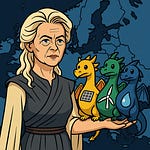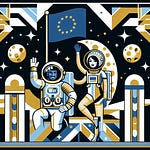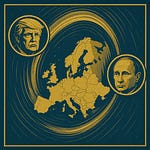🌍 Europe at a Crossroads: The Key Developments Shaping 2025
📅 Monday Morning Deep Dive | Good Morning Europe
As the world wakes up to another week, Europe is at a pivotal moment. Major geopolitical shifts are unfolding, with the UK and the EU attempting a fresh start, Bulgaria and Romania finally securing their place in Schengen, and Ukraine edging closer to EU membership—all while a war rages on. Let’s connect the dots and explore how these developments are shaping not only Europe but the world.
🇬🇧 EU-UK Relations: A Reset or Just Rhetoric?
🔹 New Era or Old Wounds?
Since Brexit, UK-EU relations have been defined by trade disputes, political clashes, and economic uncertainty. But with a new UK government in power, there’s a shift in tone. Plans for a 2025 UK-EU summit suggest a renewed commitment to cooperation.
🔹 Security First: A Unified Front?
With concerns over Russia's aggression in Ukraine and questions surrounding U.S. commitment to NATO, deeper UK-EU defense collaboration makes strategic sense. The UK, a military powerhouse, could play a critical role in strengthening Europe’s defense framework. However, trust must be rebuilt, and the UK has historically preferred an independent defense stance.
🔹 Economic Ties: Growth vs. Sovereignty
Closer economic ties could significantly boost UK GDP and benefit the EU. However, key issues remain—will the UK align with EU regulations, or will it continue its Brexit-driven sovereignty-first approach? Balancing cooperation with autonomy is proving to be a tricky act.
🔹 Opportunities Ahead
Stronger trade agreements could alleviate post-Brexit disruptions.
A well-structured security pact could enhance Europe's geopolitical standing.
Political goodwill, especially from Poland, signals that some EU members are eager for closer ties.
✅ Bottom Line: If successful, this reset could create a more secure, economically resilient Europe. However, skepticism remains—will promises translate into real action?
🇧🇬🇷🇴 Bulgaria & Romania Enter Schengen: A Win for Free Movement
🎉 After years of waiting, Bulgaria and Romania have officially joined the Schengen Area, allowing passport-free travel by land, air, and sea.
🔹 Why Did It Take So Long?
Austria previously blocked their entry over concerns about illegal migration. To address these concerns, both countries invested in border security and implemented the Schengen Information System (SIS), a move that ultimately paved the way for their acceptance.
🔹 Economic & Social Impact
Businesses in Bulgaria and Romania now have seamless access to EU markets, making trade more efficient and cost-effective.
Tourism is expected to surge, with easier travel attracting visitors and boosting local economies.
This marks a symbolic step toward deeper EU integration, showing that newer EU members can achieve full inclusion.
🔹 Challenges & Questions
While this is a major milestone, the EU still faces ongoing migration challenges. How will this expanded Schengen Area affect migration flows? And will concerns over border management resurface?
✅ Bottom Line: This is a huge win for economic growth and EU unity. However, it also highlights the delicate balancing act of migration policies in Europe.
🇺🇦 Ukraine & the EU: A Future Member State?
🚀 Despite ongoing war, Ukraine’s EU accession negotiations have begun. This is unprecedented—never before has a country in the middle of a war sought membership.
🔹 What’s the Message Here?
The EU’s commitment to Ukraine is crystal clear: Ukraine belongs in Europe. However, while negotiations have begun, full membership remains a long-term goal.
🔹 Major Challenges on the Road to Membership
Even beyond the war, Ukraine needs major reforms to meet EU standards in areas like:
✅ Judicial system & anti-corruption measures
✅ Democratic institutions & rule of law
✅ Economic development & market stability
🔹 EU’s Support: More Than Just Words
€50 billion in financial aid for reconstruction and modernization.
Military assistance without direct intervention, balancing support while avoiding further escalation with Russia.
A long-term vision: Even if full membership takes years (or decades), Ukraine now has a clear path forward.
✅ Bottom Line: While full membership isn’t imminent, Ukraine’s EU aspirations are a powerful symbol of European unity. This is about more than policy—it’s about a vision for the future of Europe.
🌍 Why Should This Matter to You?
It’s easy to see these stories as “just European politics.” But the reality is, Europe’s decisions have global consequences.
🔹 Trade & Economy: EU trade policies affect global markets and supply chains.
🔹 Security & Defense: If Europe strengthens its defense alliances, it affects global security structures, including NATO.
🔹 Migration & Borders: EU migration policies influence global movement patterns and international border policies.
✅ The EU isn’t just shaping its own future—it’s shaping the world’s future.
🚀 Final Thoughts: A Crossroads for Europe
📌 The UK is redefining its role in Europe.
📌 Bulgaria & Romania are proving that persistence leads to inclusion.
📌 Ukraine’s EU path is a sign of unwavering European solidarity.
This is a time of both uncertainty and opportunity. Europe has the potential to be a force for stability, prosperity, and democratic values—but it will take leadership, vision, and resilience.
💡 What are your thoughts? Should the UK and EU rekindle closer ties? Will Schengen expansion strengthen the EU? Can Ukraine realistically join the EU in the coming years?
Let’s keep the conversation going! 🚀🇪🇺✨
🎧 Missed the podcast? Catch up on this deep dive with EuroPragmatist’s latest episode!












